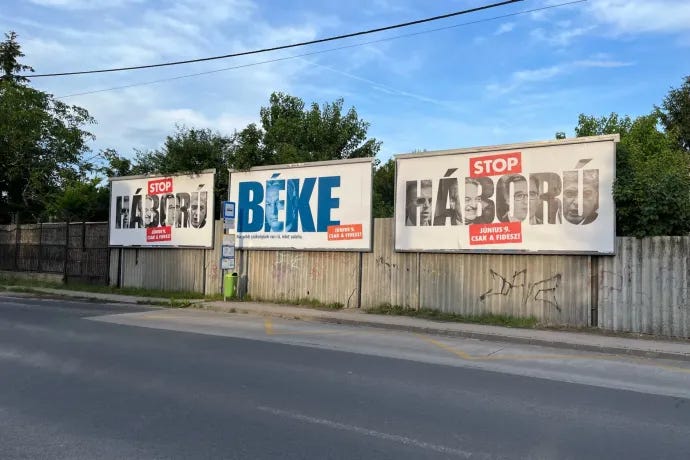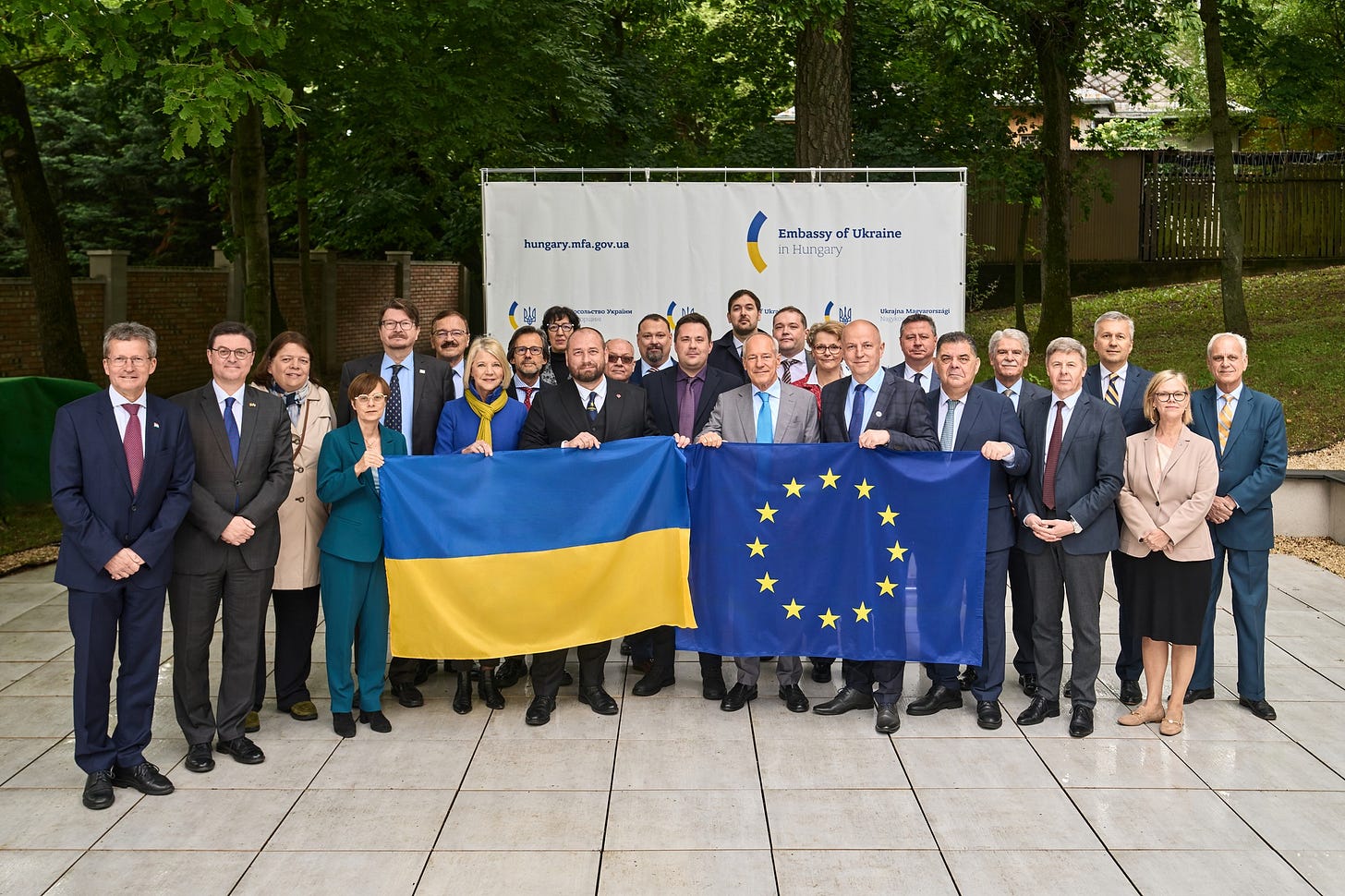This morning, the Ukrainian secret service, SBU, published a video about the detention of two Hungarian nationals in the Western Zakarpattia region of Ukraine. The two persons are charged with treason and espionage. According to the SBU, they were recruited by a third individual, a Hungarian intelligence officer, to gather information on the Ukrainian defenses in the area and how the region’s population might react to a Hungarian invasion.
Do we really want to invade Ukraine? The short answer is no, but bear with me for a deep dive into Hungarian imperial dreams, Russian manipulation, and the endless hubris of Viktor Orbán.
The region
Zakarpattia became part of the Soviet Union in 1946. For roughly 20 years prior, it belonged to Czechoslovakia. Between 895 and 1921, it was part of Hungary. Hungarians first entered the Carpathian Basin through this region's Verecke (Veretskyi) Pass. The area is rich in Hungarian historic landmarks.
The previous paragraph is a good approximation of what you learn in a Hungarian school about Zakarpattia. The fact that it has always been a Slavic majority region is, let’s say… less detailed in our schoolbooks.
Apart from the first 40 to 50 kilometers from the current border, the region has always been home to the Ruthenians. Whether they are Ukrainians or not could be the subject of an interesting scientific article, but for the purposes of this article, yes, they are Ukrainians, especially since the war broke out and some of the more badass brigades of the Ukrainian army are recruited from Zakarpattia. The area also had a significant Jewish population; many Hassidic dynasties stem from the broader region. (Satu Mare, or Satmar, is located on the Romanian side of the Ukraine-Romania-Hungary border).
The temptation
It’s a widely held belief in Hungary that in 2014, when Russia first attacked Ukraine, Putin offered Hungary the chance to recapture Zakarpattia. Why is this a tempting offer? I have some family over there, and a lot of friends too. So believe me when I tell you this: Zakarpattia was the ass-end of the Soviet Union—a peripheral little oblast with almost exclusively non-Russian population.
The Soviets needed it only because of its strategic location. At least two important passes in the Carpathian Mountains became Soviet territory. In WW2, even the battered and weak Hungarian army could hold its positions for some time before the Red Army broke through. A radar in Munkachevo could detect everything down south to Zagreb and Beograd.

Otherwise, the area is poor; it has a large, never-integrated Romani population, the infrastructure is battered, and it was a paradise for smugglers before the war. Even if our stupid imperial dreams became true, it would be an East Germany situation for us to bring them up to EU levels.
Still, any Hungarian leader who recaptures “our rightful Hungarian lands” will be regarded as a saint here, a hero, or even a king. So, naturally, they dream about it. They don’t dream about the dire consequences.
But those are not even dreams. Those are masturbation fantasies of some Hungarian politicians.
Sadly, the Russians realized that Orbán is one of these politicians.
The “whisper propaganda” (our word for the grapevine) knows “for sure” about the repeated Russian offers. It is also known that the Hungarian government has utilized one of our most powerful assets, the EU passport, to build influence in Zakarpattia.
In recent years, anyone who could produce some proof that their ancestors were subjects of the Kingdom of Hungary (basically everybody in the region and beyond) and could ask for a beer in Hungarian received Hungarian citizenship. Freedom of movement within the EU? Unlimited work permit? Oh yes, m’dear, I’m Hungarian AF! In my street in Budapest, they built a house last year, and the construction site had Ukrainian warning signs and posters because every single Bob the Builder was Mihailo the Builder…
One can only guess how many Russian (and Ukrainian) spies got nice, clean biometric documents to move freely within the EU.
The video footage released by SBU shows that the “spy” was most likely an ethnic Ukrainian or Ruthenian because he spoke better Ukrainian than Hungarian.
Ukrainian authorities recognized the threat, and it is safe to assume that Zakarpattia hosts a robust counter-intelligence operation. It is known for a fact that the Ukrainian services have followed every step of the Hungarian consulate in Berehove in the Zakarpattia region to monitor the situation with Hungarian passports.
This is why I cannot understand how Orbán could be so stupid as to actually do this.
Spying is, naturally, standard practice. Each nation, including Ukraine's staunchest allies, maintains their own operatives on the ground, as events in Ukraine are of utmost importance for European security.
But if the Ukrainians tell the truth about yesterday's raid, the Hungarian spies asked questions they shouldn’t have asked—ever.
And now, for some coincidences
Orbán’s party frequently utilizes taxpayer funds to acquire all available billboards nationwide for propaganda. For nearly a year now, these billboards have proclaimed that Orbán is the sole leader genuinely seeking peace, while labeling all others as warmongers.
Yesterday, Péter Magyar, Orbán’s main challenger (the guy under the letter “H” on the grey “Háború” sign), released a leaked recording from 2023 featuring Kristóf Szalay-Bobrovniczky, the Minister of Defence. In the recording, Szalay-Bobrovniczky discusses how the Hungarian army must prepare for war. He stated that he had replaced the former CinC General Romulusz Ruszin-Szendi and most senior officers so that the Hungarian armed forces could begin this preparation in earnest.
Just a day later, the SBU acts to apprehend two minor spies. The footage and official statements indicate that the SBU likely identified them much earlier and were likely fed false information. It’s possible that someone in Kyiv, perhaps Kyrylo Budanov himself, believed that with that recording released, it was time to rock the boat under Orbán.
Another reason might be an article by Maria Schmidt, a historian and a member of Orbán’s inner circle.
In this article, titled “What happened in Bucha?” Schmidt regurgitated the worst Russian propaganda about the infamous Bucha massacre. Here is one sentence of the article; the rest is even worse:
“By evacuating Bucha, a strategically important town of 40,000 people located next to Antonov Airport, the Russians wanted to prove their goodwill and commitment to peace.”
The article concluded that the massacre was an inside job.
Forgive but don’t forget (and not forgive, either…)
On the same day this article appeared, Olha Stefanishyna, the Deputy Prime Minister for European and Euro-Atlantic Integration and Minister of Justice of Ukraine, was in Budapest. According to my sources, the overall tone of the talks was not friendly but rather constructive and professional, and both sides considered it a step toward normalizing Ukrainian-Hungarian relations. The visit was preceded by several trips to Kyiv by Levente Magyar, a state secretary (deputy minister) at the Hungarian Foreign Ministry.
The article was indeed a rude gesture. Yet, there was no severe backlash. Minister Stefanishyna downplayed its significance, and everyone appeared ready to overlook the faux pas. It seems that the Ukrainians did not forget it, just like they did not forget dozens of similar rude moves in the past few years.
The Hungarian government and Maria Schmidt—who ironically directs the House of Terror, a museum dedicated to the violence and oppression under Nazi and Communist regimes—failed to recognize that in post-war Ukraine, Bucha will symbolize Russian aggression and serve as a memorial of the countless innocent victims of war. Ukraine cannot and will not tolerate its desecration.

Péter Magyar, on the other hand went to Bucha and showed proper reverence. All these factors came together this morning. By the way, today is also Europe Day, which celebrates peace and unity in Europe. The EU ambassadors in Budapest visited the new Ukrainian ambassador in Budapest, Sándor Fegyir (Shandor Fedir), and posed for this family photo:
The Hungarian MfA has dismissed the news as “Ukrainian propaganda." But... seriously... how can our government be so idiotic? I’ve been commenting on their actions for over ten years, and I’m still flabbergasted by their stupidity. I always tell myself, okay, we reached the rock bottom, they can’t get more idiotic than this. And then…
I just realized that this is a great opportunity to learn a Hungarian saying.
“Mindig van lejjebb” (meen-deeg van ley-yebb)
“There is always a step further down.”








No idea why, but the events in politics over the past few days have kept reminding me of a one-minute story by our beloved István Örkény, written back in 1973. It just never gets old.
LET US LOOK TO THE FUTURE WITH HOPE!
Roughly one hundred and ten to one hundred and fifteen years from now, on a fine summer’s day, the bells of the entire nation will toll outside of schedule. Most people won’t pay them much attention, and yet that chiming will mark the dawn of a great transformation.
By then, the once royal palace of Visegrád will have been rebuilt in breathtaking splendor, with vast halls and hanging gardens the likes of which the world has never seen. The peal of the bells will signal the opening ceremony. A few venerable elders will shed tears, for that moment will be the very instant — long overdue — when a thousand years of misfortune finally come to an end.
By then, Visegrád will no longer serve as the seat of this small nation, but rather of the Danubian Hungarian Republic, whose shores will be washed by four or five seas. It will be called “Danubian” to avoid confusion with another state: the Lower Rhenish Hungarian Republic, inhabited not by Hungarians, but by shabby, worn-out Rhenish folk who adopted the Hungarian name purely for good luck.
Words will fail to capture how wonderful it will be to be Hungarian! Suffice it to say that within a mere century and a bit, the word “Hungarian” will have evolved into a verb — one joyfully absorbed by every living language, bearing thoroughly pleasant connotations.
In French, for instance, magyarni will mean “to skillfully pleasure oneself.” In Spanish: “to find money in the street and bend down to pick it up.” In the Catalan dialect: “To bend gracefully, ever since I was cured of my debilitating lower back pain.” And in London, should someone declare I am going magyarni, it will mean: “I’m heading over to that divine woman you see there, I’ll speak to her, take her arm, bring her home and…” (Here, a vulgar word will follow.)
Another example: I magyar, you magyar, he/she magyars — since it will, of course, be an –s verb — will signify, in seven civilized tongues (Norwegian, Greek, Bulgarian, Basque, and so on): “I am eating crispy roast duck (you are, he is), with fresh cucumber salad, while Yehudi Menuhin plays ‘Just One Girl’ into my ear.”
Furthermore: Mommy, can I go and magyar? – You may magyar! will mean in Latvian that a little boy is asking to go to the cinema, and after a moment’s hesitation, his mother lets him — even though the film is rated 18 and up.
But enough about foreign lands! Things will be renamed here at home too. For example, the word “vanilla,” being foreign, will fall out of use and be replaced in the public mind by “war,” which will have by then lost all of its original meaning. Thus, the sign above the ice cream counter in the Visegrád confectionery will read:
Strawberry
Punch
War
Chocolate
That’s how life will be. Until then, we simply have to get through these few remaining years.
Great summary, last weeks truly been clusterfucks upon clusterfuck for the Orban regime, and it's still almost a year until the elections...